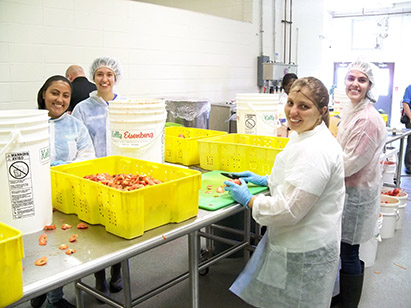
FAYETTEVILLE, Ark. – Brazilian students in the University of Arkansas’ Visiting Student Program are giving back to the Northwest Arkansas community by helping to make and bottle spaghetti sauce for the Arkansas Hunger Relief Alliance.
The goal is to produce 15,000 jars of sauce and sell them in local grocery stores and boutique shops, and all profits will benefit the alliance.
The spaghetti sauce project began in mid-July and will conclude at the end of the month.
Some of the Brazilians involved in the project are participating as part of an Experiencing the Food Industry course in the Department of Food Science and others are interns. All of the visiting students are sponsored by the Brazil Scientific Mobility Program, administered by the Institute of International Education and facilitated by the University of Arkansas’ Office of International Students and Scholars, Sponsored Student Programs and Spring International Language Institute.
During the students’ year-long stay on campus, they will complete academic coursework related to food science and an internship in the food science industry. Students from Brazil comprise nearly half of the 180 participants in the Visiting Student Program, which hosts visiting students from more than a dozen countries.
Gabriela Ojeda, a participating intern, said the students have been involved in each phase of the spaghetti-making process.
“We have been cutting tomatoes and carrots and now we are cleaning and labeling jars,” she said. “I like to be a part of this. I like to help with hunger relief. I know that I am doing something that will help others.”
Ana Heloisa Da Silveira Venzel is also serving as an intern and, like Ojeda, enjoys being involved in the project and enjoys seeing each step of the process.
“I help with everything,” she said. “I saw the truck come here full of tomatoes, and now I am labeling the jars. It’s a lot of work, but it’s very fun. It’s a great idea.”
Jeremy Adams, food sourcing and logistics manager for the Little Rock-based Arkansas Hunger Relief Alliance, is helping to head the operation. He explained that the spaghetti sauce project is part of the Arkansas Gleaning Project; gleaning is the practice of salvaging crops after harvest. The crops are given to those in need, once they have been gleaned.
“Last year, we salvaged 1.5 million crops that would have rotted, and we put them into six regional food banks,” he said. “We get tomatoes, watermelon, pecans, cabbage, cucumber…if you can pick it up and eat it we will go out and get it.”
Adams said that the Arkansas Gleaning Project is currently grant-funded, but his organization saw the spaghetti sauce venture as an opportunity to make the program self-sustainable, while at the same time supporting the community.
“Right now we’re funded by grants, but it may not always be that way, so we’re trying to be proactive. We’re helping Arkansans in need and using local produce to do it,” he said.
Clanton Farms in Hermitage donated the tomatoes and the recipe was provided by Scott McGehee, a successful Arkansas chef and restaurateur.
The help of the Brazilian students has been invaluable in the project’s success, according to Adams.
“They have been a great help and a huge asset. It is work, but we try to make it fun. They are really enthusiastic. Plus, they’re getting practical experience in their field,” he said.
Steven Seideman, an extension food processing specialist in the University of Arkansas System's statewide Division of Agriculture, is instructing the Experiencing the Food Industry course. Seideman said the students are enjoying helping with the project and said that having them on campus has been beneficial.
“They are always laughing and having a good time. I’m happier just being around them,” said Seideman, who also holds an appointment with the Dale Bumpers College of Agricultural, Food and Life Sciences. “I’ve learned so much from them. I think I’ve learned more from the students than they have learned from me.”
Topics
Contacts
Amanda Cantu, director of communications
Graduate School and International Education
479-575-5809,
Steven Seideman, extension food processing specialist
Division of Agriculture
479-575-4221,